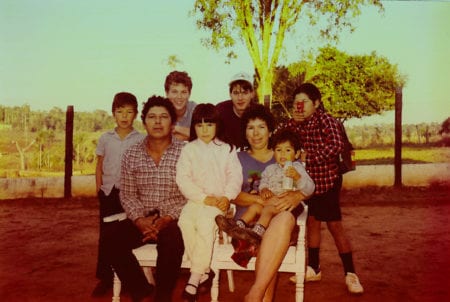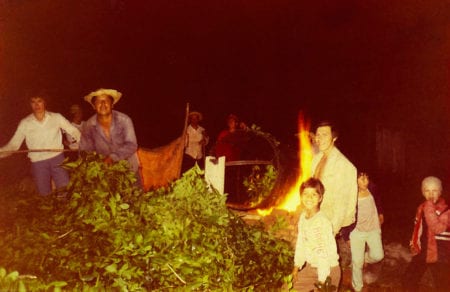We caught up with AMIGOS alum Steve Schafer (Paraguay 1990) to ask him some questions! Steve is the author of The Border, a story about four Mexican teens who flee to the US through the scorching Sonoran desert after getting caught in the crossfire of the narco-violence along the US/Mexico border.
Steve Schafer has a Masters in International Studies from the Lauder Institute at the University of Pennsylvania and an MBA from Wharton. He grew up in Houston and has since had the privilege to live, work, volunteer, and travel internationally. The bulk of this experience has been in Latin America. Steve lives in Philadelphia with his wife and two kids.

Where did you go with AMIGOS and what made you want to participate?
I went to Paraguay. I knew a few people who had done AMIGOS and raved about it. They were all the kind of people I admired. So, I signed up.
Can you tell me about a particular moment from your time with AMIGOS that you remember clearly?
My host family grew yerba mate (a super-caffeinated tea). After harvesting it, they would roast it at night over open fire in a large tumbler. We spent several nights helping with this, along with nearby family and neighbors. Wired on yerba, we stayed up into the wee hours working in different roles, while taking breaks to enjoy the stars and conversation. I really bonded with my family over this experience. It is when I most felt like I was part of the community.
Tell me about your host family.
They were a young family with four kids, all under the age of ten. They were amazingly inclusive and caring, as was the entire community. Our town had about 70 families with farms widely dispersed throughout low-rolling hills.
Do you think your time with AMIGOS affected the person you are today or shaped your values?
Absolutely. In so many ways. It motivated me to learn Spanish. It gave me the courage to move to Chile after I graduated from college. It led me to consider different service projects in other countries. And most importantly, it greatly shaped my world view. I went there thinking I would help them. And I believe I did—but they helped me just as much, or more. I learned so many lessons from them. It redefined how I thought of “developed” and “developing” countries, decimating any perceived hierarchy between them.
Did you always want to write? What made you want to write ‘The Border’?
I didn’t develop an interest in writing until I was an adult. I always considered myself creative, and I had a variety of outlets for that creativity throughout my school years. But after my first few jobs post-college, I realized I was no longer being creative day-to-day. I felt the loss and began to explore different hobbies. After self-recording possibly the worst music album in history, I found a better fit with creative writing.
The story in ‘The Border’ was seeded an unfortunate real event that happened to a friend’s family in Northern Mexico. But I didn’t want the focus to remain on this negative situation. I felt that the real opportunity with this story to was to create empathy for a grueling immigrant journey along the border with Mexico.
What impact can literature have on someone’s perspective?
Facts and figures only go so far. They inform, but they don’t speak to the heart. Literature gives you the opportunity to intimately know someone whose life is extremely different from your own. It takes you beyond what they do—it explains why they do it. Understanding this forces you to consider that if you were in their situation, you might do the exact same things. That’s empathy, and this is the fuel for productive relationships of any kind.
When you think back about your time with AMIGOS, do you see it differently than you did when you were younger?
No. At that time, I thought of AMIGOS as opening a window to another world and perspective for young people. I still think about it in this way.
What value do you think AMIGOS has in today’s world?
Three things:
1) The programs help the communities they serve in Latin America.
2) It expands the worldview of the US volunteers at a highly influential age, priming them to shape their lives around making a difference.
3) It promotes cultural exchange. I’m of the belief that most cultural differences fade to nuance once you get to know someone from another culture. We are all people. This is a simple, but invaluable perspective that we need to combat the bombastic vitriol that tends to make news headlines.
Do you ever think about AMIGOS, and if so, when? What triggers those memories?
Yes, when I reflect on who I am today. AMIGOS was the trigger for decades of other experiences across Latin America (and the world). Life would not have been the same for me had I not done the program.
Do you remember a funny or an interesting story from your time with AMIGOS?
While walking in an open field with my partner, we both noticed an odd noise. A buzzing, getting louder by the second. We turned to see a black cloud approaching. Quickly. Our minds both went to the same immediate conclusion—together we yelled, “Killer bees!” We ran for our lives, but it was a futile effort. They were soon upon us. We tumbled to the dirt, turtled our heads beneath our shirts, and whimpered goodbyes. Moments later, the cloud passed, leaving the two of us unscathed and incredulous. We had survived the bees! We told our host family about this, who laughed and informed us that it was just locusts. Terrifying, killer-bee-impersonator locusts.
What advice do you have for young people today?
Explore. Get to know other cultures. Immerse yourself in the experiences. Be a good ambassador of us.


